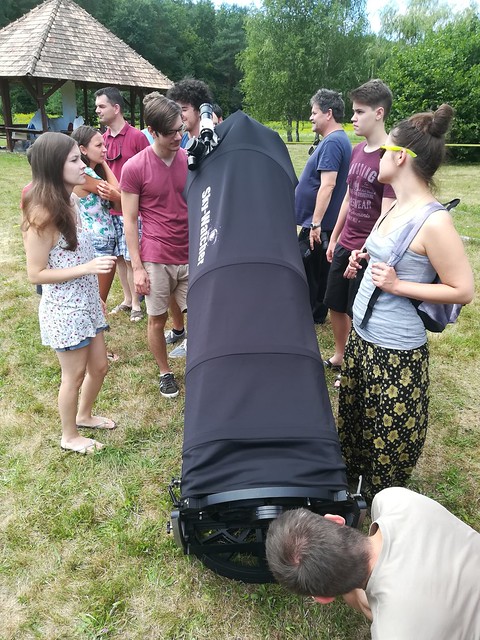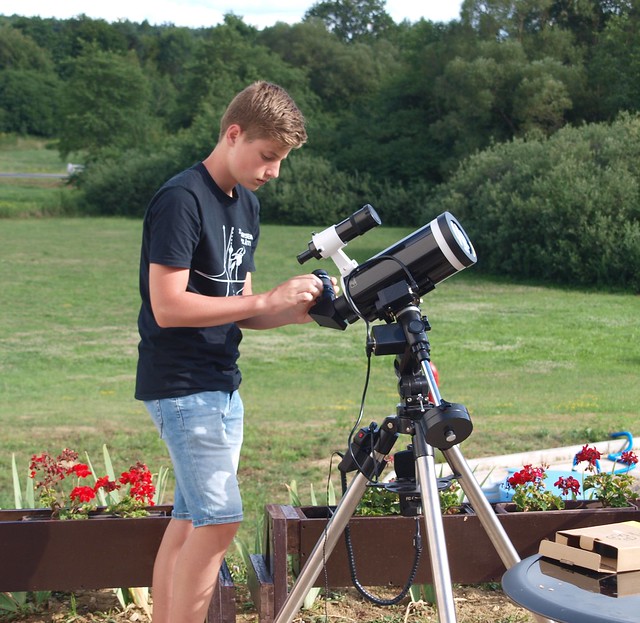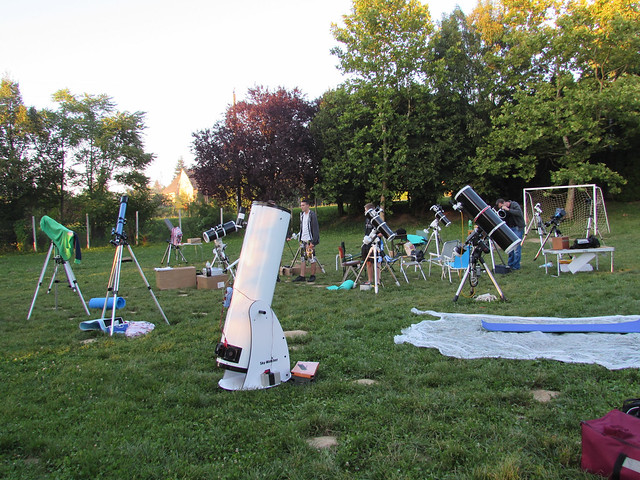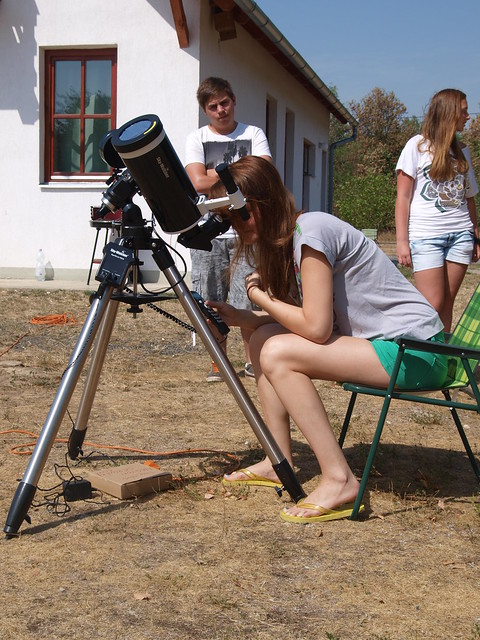VEGA ’23 Summer Amateur Astronomical Observation Camp
In 2023, the camp is jointly organized by the Vega Astronomical Association, the Zalaegerszeg Group of Hungarian Astronomical Association, the TIT Öveges József Educational Association, the Transylvanian Hungarian Astronomical Association and the Bundesrealgymnasium Kepler, Graz.
Please do not send a participation fee until you have received feedback on the acceptance of your application!
Location: Ispánk (Vas county, Hungary), Arkánum Vendégház (Arkánum Guest House).
Start: Friday, August 11, 2023, 4:00 p.m.
End: Saturday, August 19, 2023, 11:00 a.m.
APPLICATION:
Regular application deadline: July 1, 2023.
Late application: July 2 – July 25, 2023
THE APPLICATION FORM is available here.
The VCSE GDPR policy is available here (in Hungarian).

ERASMUS+ program: The Universe to Youths (2021-2-HU01-KA220-YOU-000048482).

Dear Member, Friend!
We cordially invite you to our 32nd summer camp this year!
Are you interested in the Universe, the world of the stars?
Would you like to learn how to operate astronomical telescopes?
Would you like to see the Ring Nebula, the Andromeda Galaxy, the Veil Nebula, the Omega Nebula, etc. with a 2″ UHC or OIII filter, in a 46 cm telescope, with 360x magnification?
Would you like to learn the constellations with the help of an expert guide?
Do you want to know more about deep sky objects?
Would you like to take astrophotographs or create an astrolandscape?
Would you like to gather astronomical knowledge in the form of lectures and discussions?
Do you want to be in a great company?
Even ff you answered yes to just one or two questions, this is the place for you. We welcome beginner, intermediate and advanced amateur astronomers and those interested in astronomy, both old and new, to the camp. In the camp, professional astronomers who are working both abroad or in Hungary, well-known and experienced amateur astronomers demonstrate the basics of astronomy and hold lectures, workshops, and night sky tours.
This year we organize our camp in Ispánk, a village with a population of ca. 100 in Vas County. We will stay in the Arkánum Guest House on the edge of the village, and we will observe in its huge yard. There is essentially nothing to disturb the observations here during the summer period. There are no shops in the village, but there are several shopping opportunities in Őriszentpéter, 3 km away. Not far from the settlement (28 km) is the Hegyhátsál Observatory. One of the largest instruments of the camp will be the VAA’s 46 cm Dobsonian telescope, which can be seen in the picture below (but according to promises, a larger Dobsonian telescope will also arrive at the camp).

46 cm (458/1900) Dobsonian telescope at the 2017 Ispánk camp. The telescope is the property of VAA, since June 2017.
The one and a half minute video available here provides sufficient information about the features of the location. The observing field will be the large courtyard in front of the guest house.
Our previous camp reports are available here (in Hungarian – with a lot of pictures):
2022 camp report here,
2020: available with photos here,
2017 camp report here,
The 2016 Zselickisfalud camp can be found here.
The short film made at the 2019 camp can be viewed here (switch on the English subtitles):

Dániel Jandó prepares for solar observation at the 2017 Ispánk camp with Szilárd Csizmadia’s 127/1500 Maksutov-Cassegrain telescope
Maximum 70 people can participate in the camp at the same time.
You can sleep in a stone house in apartments for 4 people or in rooms with 8 and 10 beds. It is also possible to stay in your own tent or in an association’s tent. VAA can only provide a limited number of tents (we have 2×3 + 2×2 tents), so if these spaces are sold out, tenters must bring their own tents. Those who camp will nonetheless get a bed in one of the rooms.
There will be refrigirators which can be used freely based on a verbal agreement between the campers. If you are camping and do not use the bed, we cannot give it to someone else – it will remain empty.
Camp participation fees for those who registered for the full camp (August 11-19):
| You are a member of: | Normal registration between 01.06.2023 and 01.07.2023/strong> | Late registration between 02.07.2023 and 25.07.2023 |
| VAA | 60 000.- HUF | 75 000.- HUF |
| Zalaegerszeg Group of HAA, TIT Öveges Association, Izsák Study Circle Association, HAAT, Astronomical Circle of BRG, Styrian Astronomical Association | 60 000.- HUF | 75 000.- HUF |
| None of the above | 117 000.- HUF | 117 000.- HUF |
| Deadline of the payment: | Within five working days after the application, but not later than July 2023. 26. | Within five working days after the application, but not later than July 2023. 26. |
If you are coming onl yduring the first/second half of the camp (independently of the days/nights you spent there, August 11-15 or August 15-19):
| Normal registration between 01.06.2023 and 01.07.2023 | Late registration between 02.07.2023 and 25.07.2023 | |
| VAA | 30 000.- HUF | 38 000.- HUF |
| Zalaegerszeg Group of HAA, TIT Öveges Association, Izsák Study Circle Association, HAAT, Astronomical Circle of BRG, Styrian Astronomical Association | 30 000.- HUF | 38 000.- HUF |
| Nobe of the above: | 59 000.- HUF | 59 000.- HUF |
| Deadline of the payment: | Within five working days after the application, but not later than July 2023. 26. | Within five working days after the application, but not later than July 2023. 26. |
You can find information about cecoming a member of these organizations on their website.
Discounted places in the camp are given in the first round (until June 5, 2023) to those who were already members of the above organizations on or before May 4, 2023. Those who enter later will be put on a waiting list, and we can offer them a place if there are still free places in the camp after June 5, 2023.
Those wishing to participate with the non-discounted participation fee (HUF 117,000/person/camp) can apply at any time.
In addition, the discounts can only be used by those who have settled their membership fees for the year 2023 (and, if there is a delay, also retroactively) by the time of application.
Applications will be confirmed by e-mail. Applications will only be finalized if the participation fee is transferred to Vega Astronomy Association’s bank account:
75500258–10819342–00000000 (HUF) or
Day ticket: Day tickets are not available in 2023.
Revocation, cancellation: after deducting our bank charges (HUF 600), the camp participation fee will be returned to those who cancel their participation by June 11, 2023. If you cancel your participation between June 12 and July 1, 2023, we can only refund 50% of the camp participation fee. If you cancel your participation later than this, we cannot refund anything this year due to the financial circumstances.
Age limit: only those who turn 13 by the time of the camp can participate without parental supervision. You can come to the camp without an age limit with parental (or sibling over 14) supervision. We welcome both the elderly and the young!
PURPOSE AND PROGRAM OF THE CAMP:
The official language of the camp is Hungarian until the 15th, and English after the 15th, as we hold the lectures together with the participants of the TUTY meeting. (It is expected that 2/3 of the campers will still be Hungarian native speakers.) Camp extra: free language lesson for everyone 🙂
The camp is basically an amateur astronomy observation camp based on night life. This year, the maximum of the Perseid meteor shower falls within the duration of the camp, we want to detect the maximum as well.
We reserve the right to change the program! The program can change greatly depending on the weather, since it is an observational camp. The list of lectures is constantly updated.
Everyone takes care of their own breakfast, however, VAA contributes 2 fresh rolls per person daily. Lunch and dinner are eaten locally; lunch is usually at 12:30 and dinner at 18:30. Lunch and dinner tickets are distributed on the day of arrival at the camp. The chosen menu must be specified in advance on the application form. During the compilation of the menu, we tried to have vegetarian and lactose-free food available every day. The kitchen cannot provide gluten-free meals.
There will be cutlery on site for breakfast. On the first day (08.11) there is only dinner, on the last day (08.19) there is no lunch! If you arrive for half period: there is no lunch upon departure at 08.15, the room must be vacated by 11:00. Upon arrival on 08.15, lunch is already served, so it is advisable to arrive by 12:30. (Room occupancy is only guaranteed from 2:00 p.m.).
If you don’t want to eat lunch or dinner, you can put it in the fridge for a maximum of one day. If you don’t ask for it at all, then offer your ticket in advance(!) to the community. The kitchen can store a limited amount of portions of food that have not been taken by the end of the lunch or dinner time, so the meal ticket cannot be used the next day.
After dinner – in case of a clear sky prognosis – everyone prepares for observation (bathing, changing clothes, using mosquito repellent, etc.).
According to the program of the camp, the main attraction is visual (textual and graphical) observation of the deep sky, planets, comets and the Moon with 46 cm, 35, 30, 15, 13 cm, GoTo and Dobsonian telescopes, and photography with digital cameras and CCDs. The photos made can be taken home on your own pen drive. Other smaller instruments and our own telescopes will also be on site. Everyone can bring their own telescopes! In fact, we kindly ask you for this, if you have a telescope, bring it!

Telescopes before an observing session – Photo by Mónika Tóth (2016)
You can usually look into other telescopes. At the beginning of the camp, there will be an organized study of constellations, elementary telescope knowledge and elementary telescope usage instruction, primarily a practical guide. In the same way, there will be a joint observation guide, which you can join, but of course you can also observe independently, according to your wishes.
The observing field is in the yard directly in front of the house. Fortunately, we will be the only ones here, no one will disturb us. The view is acceptable in all directions, in the worst case, one or two trees in the western direction cover up to 10°, and the building covers up to 10-12 degrees in the north. The nearest street light is also at least 200 meters away, and the nearest lights are expected to be turned off during the camp.
At night, under the guidance of experienced amateurs, there is a drawing observation exercise at the telescopes, which you can also join.
Daytime program:
As a guideline: there are no alarm clocks, community sessions will be held at four and five in the afternoon, then after dinner, projection of astronomical images, joint discussion, preparation for observations, etc. The lecture blocks are approx. 60 minutes long (50 minutes of presentation and 10 minutes of questions and answers), the sessions are 90-120 minutes. The intermediate time is considered a free program.
aug. 11. (Friday) – Day Zero
there is no lunch
From 4:00 p.m.: arrival
In the afternoon: preparing the camp site, filling the pool, setting up the electricity supply, furnishing the rooms, pitching the tent, setting up telescopes, polar alignment, etc. If you are not a volunteer in the camp preparations, do not arrive before 4:00 p.m.! If one of the non-volunteer coworkers arrives before 4 p.m., he must pay 15 years’ worth of membership fees in cash on the spot! Those arriving after 4:00 p.m. should also expect that they may be assigned a camp preparation task, in which we would definitely appreciate your help.
18:30 dinner
aug. 12. (Saturday)
11:00: General opening presentation (Szilárd Csizmadia, Attila Jandó)
12:30: Lunch
16:00: lecture
17:00: lecture
18:30 dinner
aug. 13. (Monday)
11:00: lecture
12:30: Lunch
16:00: lecture
17:00: lecture
18:30 dinner
aug. 14. (Monday)
11:00: lecture
12:30: Lunch
16:00: lecture
17:00: lecture
18:30 dinner
aug. 15. (Tuesday)
11:00: lecture
12:30: Lunch
16:00: lecture
17:00: lecture
18:30 dinner
aug. 16. (Wednesday)
but: free program
12:30: Lunch
Car trip to nearby observatories
18:30 dinner
aug. 17. (Thursday)
11:00: The PLATO Mission (Szilárd Csizmadia)
12:30: Lunch
16.00: lecture
17:00: lecture
18:30 dinner
aug. 18. (Friday)
11:00: The structure of the Universe (Szilárd Csizmadia)
12:30: Lunch
16:00: lecture
17:00 performance
18:30 dinner
aug. 19. (Saturday)
Packing, cleaning, going home.
Official closing of the camp: 11:00.
Please help everyone pack and clean up the camp, and no one should leave before 11:00 a.m. and before they have contributed their own part to leaving the camp in a cultured way!
.
Solar observation at the 2013 camp, solar observation by Gréta Borsos – photo by Szilárd Csizmadia
The observation field is located approx. 15 meters from the house. Here, deep-sky, lunar, double/variable observations will take place in an organized form. The individual observing groups are formed in the evening, and you can join them voluntarily. In addition, of course, you can use your own telescope or the Association’s for a unique observing program. To prepare for observations, please read our guide (to be uploaded later).
The participants will receive a small observation notebook in which they can record their deep-sky observations – please hand this notebook in at the end of the camp, we will send it by post later, if needed! After lunch, the previous evening’s photos are processed, and the meteor data of each observer is transferred to the computer – together, everyone inputs their own observations!
Night groups you can volunteer to join (not all will work every night):
- learning the constellation
- workshop: secrets of astrolandscape photography
- elementary telescope exercises during the day and at night (adjustment/collimation, polar alignment, selection and adjustment of objects in the field of view, finder telescope parallelization, selection of magnification, etc.)
visual telescope observations - meteor counting
- On an ad hoc basis, other observing groups may be formed in the camp.
Basic rules and etiquette of camp behavior:
I. EVERYONE IN THE CAMP MUST BE ALLOWED TO OBSERVE AND SLEEP.
II. THE USE OF FLASHLIGHTS AND OTHER STRONG LIGHTS OUTDOOR AFTER DARKNESS IS PROHIBITED.
III. BEFORE USING TELESCOPES OWNED BY ANYONE ELSE (OR THE ASSOCIATION), ASK THE PERMISSION OF THE OWNER (OR THE PRESIDENT OF THE ASSOCIATION, OR THE PERSON IN CHARGE)!
IV. IT IS STRICTLY FORBIDDEN TO REACH AN ADJUSTED TELESCOPE WITHOUT THE OWNER’S (ETC.) PERMISSION.
V. THE USE OF ANY LASER AT ANY TIME AND FOR ANY PURPOSE IS PROHIBITED ON THE CAMP AREA. CAMP PARTICIPANTS ARE ASKED BY THE VAA NOT TO USE ANY LASER AT ALL IN ISPÁNK. (With the exception of the low-power, collimation lasers used inside the telescope to adjust the telescopes, which can be used under the supervision of people designated by the camp organizers. Another exception is supervised laser constellation teaching or, occassionaly at the beginning of the night, for polar alignment.)
1./ Bring your own telescope – but only if you can!
2./ Be prepared for downpours, wind, dust, high humidity, insects (mosquitoes!!), heat, cold!
3./ Respect established customs! Get to know them as soon as possible!
4./ Do not smoke! If you do, be considerate of non-smokers.
5./ Listen to music only through headphones!
6./ Avoid loudness and noise, especially in the morning, do not disturb those who are still sleeping.
7./ Pick up the trash after yourself!
8./ Pick up the trash after the others and warn them of this offense!
9./ Wash up after yourself!
10./ The organizers of the camp are volunteers, who also paid the same participation fee as you. If you see that by pulling a chair away you can help furnish the lecture hall, or pack it up, or similar, then go there and help without question!
11./ Take care of everyone’s telescopes! If you damage it, you must reimburse it in cash, according to the retail price of the new device.
12./ Small, careful consumption of alcoholic beverages before observation helps to achieve a better limiting magnitude with diluted pupils. However, do not consume alcohol recklessly or excessively in the camp!
13./ Speak only so that others can speak! Notice yourself when you are too much.
14./ Enjoy the camp!
Special “Vega”-rules:
I. Everyone participates in the camp, gets lost, gets drunk and drowns at their own risk.
II. In the camp, everyone should be allowed to observe and sleep. Any activity that refers to withdrawal from observing (e.g. inciting excessive alcohol consumption) is against the customs.
III. Music can be listened loudly only with the permission of the camp leader.
IV. Anyone who leaves the camp area must notify the camp leader before leaving. That way, we don’t needlessly search for you or wait for you, and if you don’t show up within 24 hours, we’ll report to the police.
V. Be cheerful!
What to bring (IMPORTANT LIST!):
Polyfoam and sleeping bag. (Possibly even a small pillow in addition.) These are optional, but they are useful for meteor counting.
Flashlight. (POCKET LAMP!!!!) If possible, its lens should be taped off with red insulating tape so that it can still be seen at night, but it can also be used for walking around. Put a fresh, new battery in the flashlight the day before camp!
MOSQUITO REPELLENT.
Swimming trunks/swimsuit.
Notebook (plain paper).
Pen, soft pencil. (PENCIL necessarily!)
Possibly a pad for drawing at night (A4 size) – optional.
Warm clothes. On August nights, it can sometimes happen that it is not 20 °C at dawn, but only 3-4 °C!
If you own one: star map, catalog, telescope (if you need electricity, bring an extension cord: because we don’t have enough! – we’ll take out some triple splitters to the observation field), cards, board games, old camp photos, thermos – these are optional.
If you can, please bring a laptop for the image processing exercises. It will require about 15-20 GB of free space. The more powerful the machine, the more RAM it has, the higher the clock frequency, the better!
We welcome everyone to the camp!
Directions to Ispánk:
By car: Ispánk is 40 km from Zalaegerszeg, by car, approx. 43 minutes away. From Zalaegerszeg you have to go towards Zalalövő. The recommended route is marked in blue; alternatively the route through Nádasd, marked in gray, is a 6-minute longer route. From Budapest, we recommend the M1-M86 route.
By bus: For information, we recommend the website www.menetrendek.hu. The bus service to Ispánk is not good, it is much easier to get to the nearby Őriszentpéter.
Train: You can travel to Őriszentpéter train station from abroad, as well as from Zalaegerszeg, and Budapest. The Citadella international express train stops at Őriszentpéter (departs from Budapest-Déli at 9:00 a.m.), otherwise there is a good connection from Zalaegerszeg to the Budapest-Déli train terminal. For more information, we recommend the website https://www.mavcsoport.hu/.
We welcome other questions about the camp to vcse@vcse.hu.
Further contact: Dr. Szilárd Csizmadia, available by phone: +36 70 283 5752.
We welcome all interested people to the camp – up to 70 people!
The program is subject to change.
Best regards, clear skies:
Dr. Szilárd Csizmadia
President, VAA
P.S.: We are thankful for the English translation to Mr Gábor Juhász, Viktória Fröhlich and to Mrs Éva Varga.


